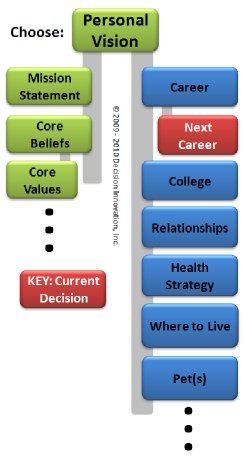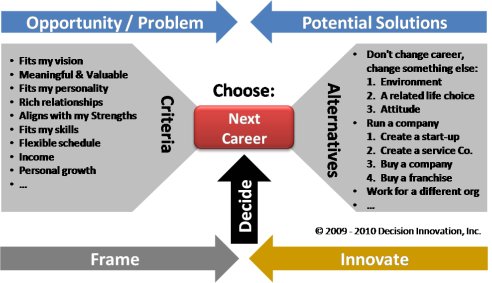Manage a career change decision as part of an ongoing decision management process
A career change decision can be one of the most challenging decisions a person can make. Both practical and emotional issues can provide barriers to making this life decision. In many cases this decision will be more difficult than an initial career choice, particularly after following a particular path for a long time.
Having followed a specific career for a number of years, it is likely that you have a significant investment in training, skill development and acquisition of knowledge and experience related to your current occupation. In addition, any change late in a career could cause one to face problems with financial support of your family or other associated community obligations. Possible impact to long term relationships could stir emotions and create unexpected behaviors, adding additional concerns to an already difficult change.
What you choose to do is not who you are!
 When you start to look at a network of your personal decisions, you start to see how a career change decision relates to the other choices that help define who you are. In most cases, changing your job, occupation, or profession doesn't change your personality, beliefs, talents, or family relations. In fact, you may find that some other life choice you have made is causing the emotional signals creating the desire to change your career in the first place. Maybe it is a way to reduce stress with your family relationships caused by your current career, or a way to eliminate job related stress associated with your career. We often focus on the symptom and fail to determine the real cause before we make a change.
When you start to look at a network of your personal decisions, you start to see how a career change decision relates to the other choices that help define who you are. In most cases, changing your job, occupation, or profession doesn't change your personality, beliefs, talents, or family relations. In fact, you may find that some other life choice you have made is causing the emotional signals creating the desire to change your career in the first place. Maybe it is a way to reduce stress with your family relationships caused by your current career, or a way to eliminate job related stress associated with your career. We often focus on the symptom and fail to determine the real cause before we make a change.
Looking at the network of related decisions exposes decisions you have made about your identity, implicitly or explicitly, from the decision you want to make for changing your career. Framing the context for your career change decision allows you to deal with change in an informed and methodical way, avoiding undesired and unintended choices and consequences.
Complete the Framing activity with the criteria and information needed to evaluate your decision
Here are some criteria that we consider when evaluating a career change decision.
- Fits my vision - I want a career that matches my life vision and is aligned with my values.
- Meaningful & Valuable - I want to accomplish something valuable and meaningful so that I will get personal satisfaction from my work.
- Fits my personality - I want a career that matches my personality and preferences.
- Rich relationships - I want a career that helps me form many rich relationships.
- Aligns with my Strengths - Greater alignment with my strengths will increase the value I can generate.
- Fits my skills - I want a career that matches my current skills, experience, education and aptitudes.
- Flexible schedule - I want a flexible work schedule that allows me to balance the things that I value in my life.
- Income - I want an income that allows me to meet the financial needs of my family and community.
- Personal growth - I want a career that causes me to grow, stretches my skills and creates opportunities for increased responsibility
Other criteria you might want to consider include stability, preparation or training time and cost, fun, uncertainty and risk, daily commute time, amount of travel, and physical fit. Consider your criteria carefully and think about some of the tools that could provide information that would enable evaluation of your alternatives against the criteria. These tools include personality tests, skills and/or strengths assessments, and interest surveys.
When making a significant career change decision, fully consider your options
A career change, especially after a long time in a specific occupation or role, can present an amazing opportunity to increase meaning in what you do. In many cases, this could start as a forced change coming from a job loss, change in leadership, or company merger. Avoid reacting, manage through the immediate circumstances, and you may find some exciting possibilities develop as you work through your options.
Your talents and situation will make your specific alternatives unique, but we found for us, our options generally fit into the following high level career change alternatives.
- Don't change career, change something else
- Change environment
- Change a related life choice
- Change attitude
- Run a company
- Create a product start-up
- Create a service company - e.g. consulting
- Buy an existing company
- Buy a franchise
- Work for a company or organization
- Leverage expertise and work in the same field
- Use expertise and peripheral skills in a related field
- Use business skills in a new field
- Train and enhance skills to start in a new field
- Leverage expertise to teach others the skills in your field

Evaluate, decide, and plan to manage the consequences and related decisions
With your decision criteria and career change alternatives in place, you can now gather information, evaluate, and reflect to make a decision. Keep all your work, and use what you have learned to create the actions required to complete the implementation of your career change decision.
Reflect your career change consequences into your network of personal decisions, and you now have a framework that you can use to manage your career change now and into the future.
Return from Career Change Decision to Personal Decision Making

